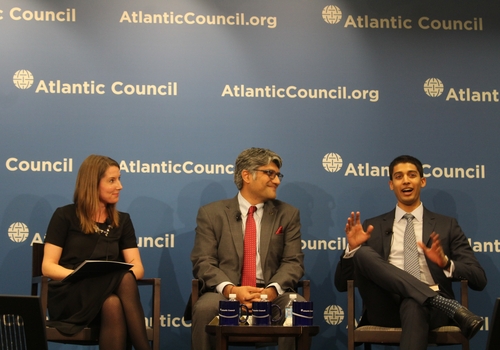 On March 20, 2018, the Atlantic Council’s Global Energy Center hosted Jigar Shah, Co-founder and President of Generate Capital, Inc, and Varun Sivaram, Philip D. Reed Fellow for Science and Technology at the Council on Foreign Relations, to discuss the the role of American leadership and the future of solar energy. David Livingston made opening remarks and introduced Sivaram and Shah, and Ellen Scholl moderated the discussion. Livingston and Scholl are Deputy Directors of the Global Energy Center.
On March 20, 2018, the Atlantic Council’s Global Energy Center hosted Jigar Shah, Co-founder and President of Generate Capital, Inc, and Varun Sivaram, Philip D. Reed Fellow for Science and Technology at the Council on Foreign Relations, to discuss the the role of American leadership and the future of solar energy. David Livingston made opening remarks and introduced Sivaram and Shah, and Ellen Scholl moderated the discussion. Livingston and Scholl are Deputy Directors of the Global Energy Center.
Sivaram identified two scenarios for the future of solar in his new book “Taming the Sun.” In the first scenario, solar suffers from “value deflation” as its share of the overall energy mix increases, causing solar’s heretofore metoeoric rise to slow far before it realizes its full potential to meet the world’s climate goals. In the second scenario, innovative breakthroughs are achieved that see solar power become cheaper, more flexible, and more valuable to the grid even at high penetration rates, allowing it to supply 33 percent of global electricity by 2050. To achieve the second scenario and thereby meet climate goals, Sivaram argued that the United States must invest in innovative solar technologies, such as perovskites, alongside two other forms of innovation: financial and systems (the business models underpinning the function of the electricity sector).
Shah countered Sivaram’s scenarios by emphasizing that Sivaram’s messaging is dangerous to solar’s future. He warned that Sivaram’s rhetoric spreads an “insidious message” that dissuades solar investments, as stakeholders will not invest in perceived “quaint” technologies that will be replaced within fifteen years. He argued that current solar technology is sufficient to achieve climate goals, and that the right policies to encourage deployment of solar and other clean energy technologies should be the focus. Regarding US leadership in solar, Shah argued that the United States is ahead due to its unparalleled financial innovation. Sivaram called for three policy recommendations to advance US leadership: increased investment in research development, structural innovation (such as grid expansion), and carbon pricing. Both agreed, however, that US leadership on solar deployment and innovation was important from the perspective of US competitiveness and dynamism.
Image: (From left) Ellen Scholl, deputy director of the Atlantic Council Global Energy Center, moderates a debate on the future of solar energy between Jigar Shah, co-founder and president of Generate Capital, and Varun Sivaram, the Phillip D. Reed Fellow for Science and Technology at the Council on Foreign Relations
